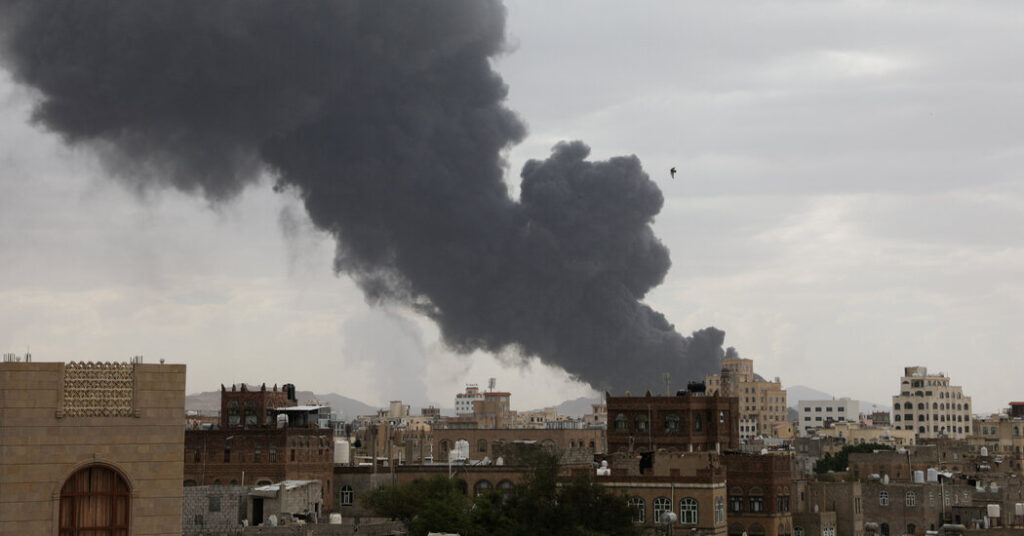Israeli fighter jets bombed the main international airport in Yemen on Tuesday in retaliation for a missile attack by the Houthi militia that struck near Israel’s main airport last weekend.
Israeli airstrikes on the Yemini capital, Sana, and other parts of the country killed at least three people and injured more than 30 others, health officials tied to the Houthi-led government said, adding that the toll was preliminary.
The Israeli strikes were the latest salvo in a battle with the Iran-backed Houthis, who rule much of northwestern Yemen, including Sana. They have fired dozens of rockets and drones at Israel, as well as at ships in the Red Sea, in what they call a solidarity campaign with Palestinians in Gaza.
The Houthis have also been the target of a stepped-up U.S. bombing campaign on Yemen since mid-March. President Trump sharply escalated attacks on the country in an attempt to degrade the militia’s capability to attack shipping — an effort that was started by the Biden administration — and Mr. Trump has vowed that the Houthis will be “completely annihilated.”
But on Tuesday, Mr. Trump said the United States would stop bombing the Houthis, claiming they “don’t want to fight anymore.” He declined to reveal how he knew the militia was backing down.
The Houthi-controlled government did not immediately respond to a request for comment about the president’s claim. But earlier on Tuesday, it released a defiant statement saying it was fighting a “holy war to aid the wronged Palestinian people in Gaza.” The Houthis are confronting “an enemy that is used to committing war crimes and genocide and targeting civilians,” it added, vowing to keep up attacks.
Yemen, located at the southern tip of the Arabian Peninsula, is the poorest Arab country, with one of the world’s worst humanitarian crises.
After the Israeli strikes, Yemeni civilians said they would suffer the most from the airport damage and disruption of flights.
Waseem al-Haidari, 42, said the airstrikes “will inflict pain and fear,” and destroy the lives of civilians. He said his 80-year-old aunt had been scheduled to travel to Yemen from her home in Bahrain to visit family next week, via the Sana airport.
“Now she won’t be able to make it,” he said. “She had longed to visit the village and see her family.”
Sana’s international airport provides one of the few remaining connections to the outside world for the more than 20 million Yemenis who live in Houthi-controlled territory, serving as a means to get lifesaving medical treatment and to reach work and loved ones abroad.
Before its attack on Tuesday, the Israeli military had issued a call on social media threatening the airport and ordering everyone in the area to evacuate. Israeli warplanes also struck power stations and a cement factory in Yemen.
“The strike was carried out in response to the attack launched by the Houthi terrorist regime against Ben Gurion Airport,” an Israeli military statement said. “Flight runways, aircraft and infrastructure at the airport were struck,” it added, claiming the airport had been disabled.
Israel previously struck the airport in December.
On Sunday, a Houthi ballistic missile evaded Israel’s air defenses to strike near Ben Gurion International Airport, outside Tel Aviv. Multiple airlines canceled flights in response to the strike — which wounded at least six people — and Israeli leaders vowed reprisals.
The following evening, Israeli fighter jets bombed the port of Hudaydah in northwestern Yemen and a cement factory east of the city. At least four people were killed, according to the health ministry.
Since striking Ben Gurion, the Houthis have declared an “air blockade” on Israel, saying that they will continue to target Israeli airports.
Yemeni analysts say the Houthis will not be deterred by the bombardments and that conflict with the United States and Israel only strengthens the group.
“Airstrikes have never deterred the Houthis in the past,” said Nadwa al-Dawsari, a Yemeni analyst at the Middle East Institute in Washington.
Sana’s airport was closed for nearly six years during a war against the Houthis by a Saudi-led military coalition that aimed to rout the militia and restore the country’s internationally recognized government. The airport reopened to commercial flights in 2022.
While the airport was closed, tens of thousands of critically ill Yemenis who needed medical treatment abroad were trapped in the country, according to the Norwegian Refugee Council, a humanitarian aid organization that operates in Yemen. Many others were stuck abroad.
To civilians in Sana, the Israeli attacks are perceived as “a form of collective punishment,” said Mohammed al-Basha, an independent Yemeni analyst based in Washington.
Sana’s airport is predominantly used for civilian travel, while foreign military experts and Houthi commanders enter the country via maritime routes or other channels, he said. Despite the strikes on Yemeni ports and the airport, the militia is still able to gain access to weapons and military technology, relying on smuggling operations along the country’s coast.
Shuaib Almosawa contributed reporting from Sana, Yemen, and Ismaeel Naar from Dubai, United Arab Emirates.

